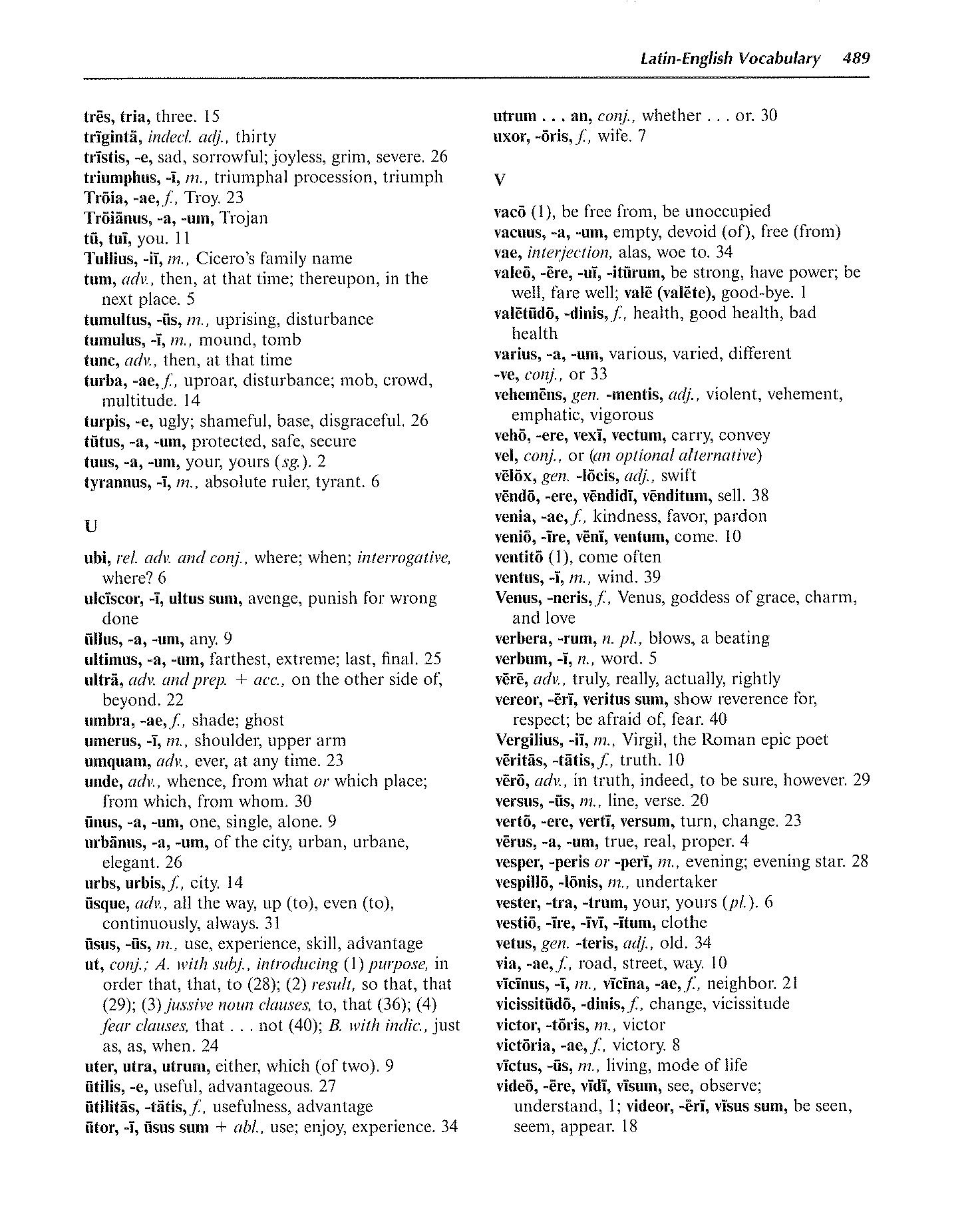
page_listing.tpl
page_subListingDetails.tpl
sub_listingDetails_style1.tpl
sub_listingDetails.title.tpl
tuus, tua, tuum your
tuus, tua, tuum is a Latin Pronoun that primarily means your.
Definitions for tuus, tua, tuum
Wheelock's Latin
Pronoun
- 1
your, yours
Oxford Latin Dictionary
Pronoun
- 1
Of, belonging to, done, experienced, etc., by you (sg), your (emph. = your own; pred. = yours). (b) (equivalent to obj. gen. of tu). (c) (neut. sg. or pl.) your property, goods, or sim., in ~o, on your land; de ~o, at your expense. (d) (neut. pl.) your writings; your affairs. (e) ~a (abl. fem. sg,) refert, interest, it is of concern to you; (also, ellipt.) quid ~a> what business is it of yours? (f) ~um est quod, it is thanks to you that. (g) (app) belonging to your kind.
- 2
(of persons) Intimately associated with you, dear to you, or sim.; (esp. with personal names of friends or relatives). (b) (of favourite teachers, writers, or sim) your beloved -; (sim. of favourite places or nations). (c) (masc. pl.) your kinsmen, associates, etc. (d) (masc.) your lover; (fem.) your girl, sweetheart.
Sentences with tuus, tua, tuum
Latin to English
Cum fīliā tuā fuge.Compare Flee (sg.) with your daughter.
Ad lūdum tuum fīlium meum docendum mīsī.Compare I sent my son to your school to be taught.
Cum cōnsilia tua nunc comprehendāmus, īnsidiās tuās nōn ferēmus.Compare Since we now understand your plans, we will not endure your treachery.
Discendī causā ad lūdum tuum vēnērunt.Compare They came to your school to learn (for the sake of learning).
Habetne animus tuus satis sapientiae?Compare Does your (sg.) soul possess enough wisdom?
Contemno Catilina gladius, non pertimesco tuus.Compare I despised the swords of Catiline, I will not fear yours.
Equidem non desino tuus decretum defendo.Compare I for my part will not cease to defend your decrees.
Argi et Lacedaemon, duo clarus urbs, lumen quondam Graceia, sub pes tuus relinquo?Compare Shall we leave beneath your feet Argos and Lacedaemon, two most illustrious cities, once the luminaries of Greece?
Data sources
Notes
- Definitions
- Frederick M. Wheelock, Wheelock's Latin, 6th ed., rev. Richard A. LaFleur (New York, NY: HarperCollins Publishers, 2005): 439.
- P. G. W. Glare, Oxford Latin Dictionary, Vols. 1-8 (Oxford: Clarendon Press, 1982): 1997.
- Word frequencies
- Christopher Francese, "Latin Core Vocabulary," Dickinson College Commentaries, last modified 2014, http://dcc.dickinson.edu.
- Paul B. Diederich, The Frequency of Latin Words and Their Endings, PhD diss., (Columbia University, 1939).
- Louis Delatte, Suzanne Govaerts, Joseph Denooz, and Etienne Evrard, Dictionnaire fréquentiel et index inverse de la langue latine [Frequency Dictionary and Inverse Index of the Latin Language] (Liège, Belgium: Laboratoire d'analyse statistique des langues anciennes de l'Université de Liège [L.A.S.L.A.], 1981): 119.
Bibliography
Allen, Joseph H. Allen and Greenough's New Latin Grammar for Schools and Colleges: Founded on Comparative Grammar. Edited by James B. Greenough, George L. Kittredge, Albert A. Howard, and Benjamin L. D'Ooge. Boston, MA: Ginn & Company, 1903.
Crystal, David. A Dictionary of Linguistics and Phonetics. 6th ed. Oxford, UK: Blackwell Publishing, 2008.
Delatte, Louis, Suzanne Govaerts, Joseph Denooz, and Etienne Evrard. Dictionnaire fréquentiel et index inverse de la langue latine [Frequency Dictionary and Inverse Index of the Latin Language]. Liège, Belgium: Laboratoire d'analyse statistique des langues anciennes de l'Université de Liège (L.A.S.L.A.), 1981.
Diederich, Paul B. The Frequency of Latin Words and Their Endings. PhD diss., Columbia University, 1939.
Francese, Christopher. "Latin Core Vocabulary." Dickinson College Commentaries. Last modified 2014. http://dcc.dickinson.edu/latin-vocabulary-list.
Gildersleeve, Basil L., and Gonzales Lodge. Gildersleeve's Latin Grammar: Third Edition, Revised, and Enlarged. 3rd ed. London, England: Macmillan and Co., 1903.
Glare, Peter G.W. Oxford Latin Dictionary. Vols. 1-8. Oxford, England: Clarendon Press, 1982.
Krüger, Bernd. "Latin Conjugation Tables." Cactus2000. Accessed May 5, 2023. https://latin.cactus2000.de/index.en.php.
Pierson, Nick. "Sound of Text." Accessed October 26, 2019. https://soundoftext.com.
Wheelock, Frederick M. Wheelock's Latin. 6th ed. Revised by Richard A. LaFleur. New York, NY: HarperCollins Publishers, 2005.
Wiktionary Contributors. "Victionarium." Wikimedia Foundation, Inc. Updated March 18, 2019. https://la.wiktionary.org/wiki/Victionarium:Pagina_prima.
Citation
Chicago (17th ed.)
Allo Contributors. "tuus, tua, tuum (pron.) - Latin Word Definition." Allo Latin Dictionary. Last modified . Accessed February 20, 2026. http://ancientlanguages.org/latin/dictionary/tuus-tua-tuum.
Entry created on . Last updated on .








